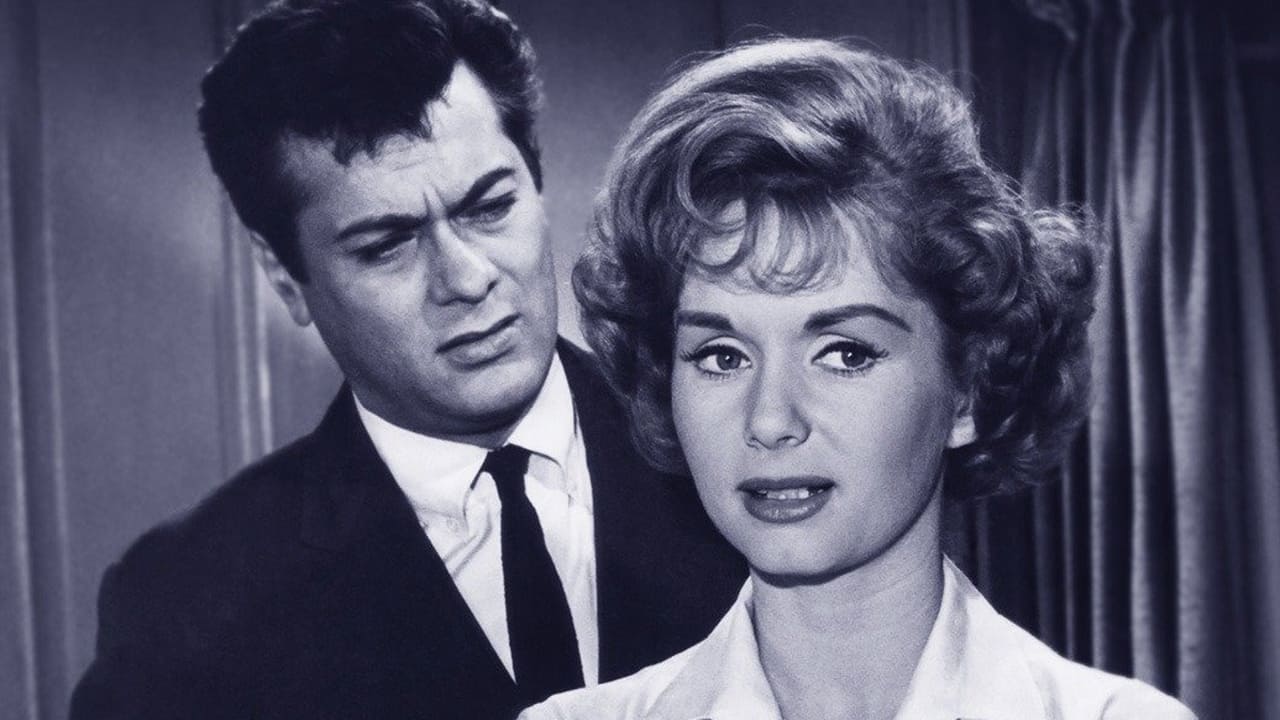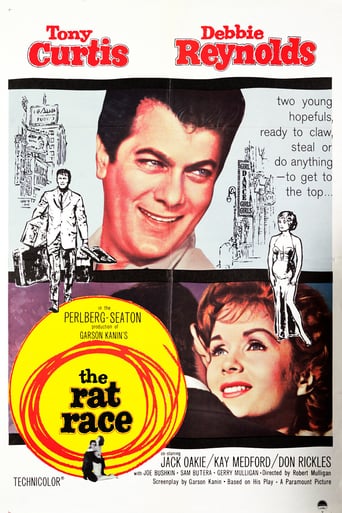

People are voting emotionally.
... View Moreone of my absolute favorites!
... View MoreGreat Film overall
... View MoreA film of deceptively outspoken contemporary relevance, this is cinema at its most alert, alarming and alive.
... View MoreNot quite innocent,but not really guilty either;that's Miss Debbie Reynolds in "The Rat Race".Many men are susceptible to a woman with a slightly bruised aspect to her and Mr Tony Curtis is no exception. It's a movie where "10 cents a dance" meets "Scrapple from The Apple" as cool jazz man Curtis shares an apartment with broke and weary taxi dancer Reynolds who has unwisely accepted a large loan from her boss Mr Don Rickles who is keen on her repaying him in the traditional showbiz manner. Daring for its time in its acceptance of the ambivalence of the character played brilliantly by Miss Reynolds,the movie gives a fairly bleak view of New York nearly fifty years ago,an era we are frequently led to believe nowadays was a golden one indeed.Clearly not if you were struggling in the lower stratum of the entertainment profession. Garson Kanin's play was 20 years ahead of its time.Less bleak than its contemporary "The Connection",but quite shocking for mainstream audiences with its portrayal of the bottom feeders of show business,the bullies,the pimps,gangsters and the compromises decent young people were forced to make to follow their chosen paths.Not to mention an unmarried couple living together. There is some fairly belicose Elmer Bernstein music diffused by an extract of typical late 1950s West Coast cool and Mr Curtis is very convincing as the aspirant jazzer with integrity (i.e.no money) Sedate by today's standards,"The Rat Race" marked a transition from 1950s movies to 1960s movies in content and tone.Not until "New York,New York" was there a more impressive portrayal of an average saxophone player and his showbiz lady,and my goodness how the movies - and the world - had changed by then.
... View MoreWhy the producers decided to cast New Yorker Tony Curtis in the film, I just can't understand. Why would they cast him of all people considering he is supposed to be playing a guy from Milwaukee who gets lost in the big bad city of New York? With his very strong New York accent, it just didn't make sense. Listening to him, he sounded like he should have been perfectly at home in the Bronx or Brooklyn! Fortunately, the rest of the movie is so good that I really didn't mind the odd casting. In fact, Tony Curtis and Debbie Reynolds were excellent in the film--with acting and dialog that seemed pretty realistic. They both play "starving artists" who come to New York but find success is somehow always out of sight. I teach at an art school and would like to show this to my students so they can, perhaps, see what it usually is like on the slow road to making a living.I also appreciated how the writers didn't allow the film to slide too far into sentimentality even though this was a romantic-comedy of sorts. That means when there can be a magical scene where things all work out perfectly, the writers chose instead to allow for a more realistic moment where things worked out,...somewhat. My favorite example was near the end when it appeared that Curtis' musical instruments unexpectedly re-appeared. This LOOKS like a "happily ever after moment" but there is a great twist--a twist that reminds us that in this film, just like in real life, Murphy's Law so often applies. To me, the real magic in the film is how despite all these setbacks and problems, the couple STILL manage to find each other and some shred of happiness. And, if you think about it, this is a great lesson for everyone.A nice, romantic, funny but occasionally sad and cynical little film about life and little people.By the way, look for Don Rickles in one of his earliest roles. He plays a guy who is amazingly creepy and cruel--quite a change from his later comedic roles. Also, the sweet guy behind the bar is Jack Oakie in one of his later roles
... View MoreTony Curtis, (Pete Hammond Jr.) plays the role as a musician who plays a saxophone, clarinet and flute and he leaves Milwaukee, Wisconsin and heads to New York City to start out on his career. Pete has a hard time trying to find a cheap place to live and winds up sharing an apartment with a girl named Peggy Brown, (Debbie Reynolds) who is a dancer and singer and has lived in New York for a few years and is having a hard time trying to find a job doing what she likes. Peggy does work in a dance hall where men buy tickets for every dance and the establishment is owned by Don Rickles who is a very shady character who has a great interest in Peggy and has loaned her $600.00 and begins to want her to repay him in more ways than one. This is a great film because Tony Curtis, Debbie Reynolds and Don Rickles played very dramatic roles and they all gave outstanding performances. Veteran actor Jack Oakie, (Mac, Owner of Macs Bar) gave a great supporting role and also some comedy. If you have not seen this film, you are missing a great 1960 Classic, so keep an eye out for this film on TV. Enjoy.
... View MoreI loved this movie about two struggling young people and the friendship and love that grows out of those struggles. You won't find any glamour in this film, but it manages to be much more beautiful than many a movie oozing pearls, silk and mahogany. All characters are interesting, likeable and well-drawn. Rickles is fantastic as an uncouth, vulgar boss, the personification of a soul destroyed. Everything is just right. As usual, it is small movies that reach the greatest heights. I once saw screenwriter Kanin and his wife Ruth Gordon on "Donahue". I'm sorry I didn't take any notes.
... View More